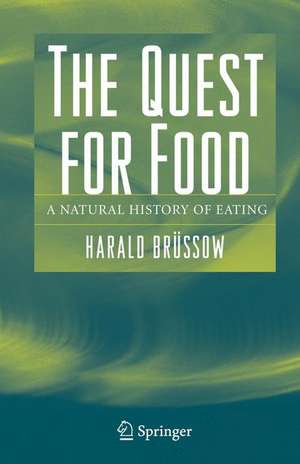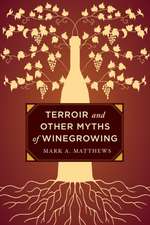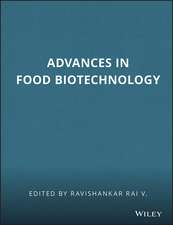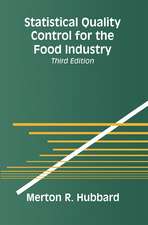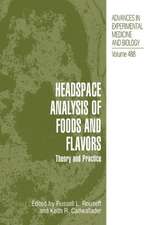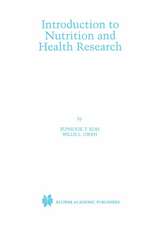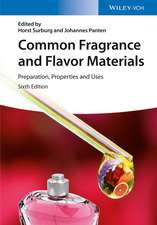The Quest for Food: A Natural History of Eating
Autor Harald Brüssowen Limba Engleză Hardback – 11 mai 2007
| Toate formatele și edițiile | Preț | Express |
|---|---|---|
| Paperback (1) | 725.77 lei 6-8 săpt. | |
| Springer Us – 23 aug 2016 | 725.77 lei 6-8 săpt. | |
| Hardback (1) | 975.43 lei 6-8 săpt. | |
| Springer Us – 11 mai 2007 | 975.43 lei 6-8 săpt. |
Preț: 975.43 lei
Preț vechi: 1189.55 lei
-18% Nou
Puncte Express: 1463
Preț estimativ în valută:
186.64€ • 195.40$ • 154.44£
186.64€ • 195.40$ • 154.44£
Carte tipărită la comandă
Livrare economică 05-19 aprilie
Preluare comenzi: 021 569.72.76
Specificații
ISBN-13: 9780387303345
ISBN-10: 0387303340
Pagini: 866
Ilustrații: XVIII, 866 p.
Dimensiuni: 155 x 235 x 45 mm
Greutate: 1.31 kg
Ediția:2007
Editura: Springer Us
Colecția Springer
Locul publicării:New York, NY, United States
ISBN-10: 0387303340
Pagini: 866
Ilustrații: XVIII, 866 p.
Dimensiuni: 155 x 235 x 45 mm
Greutate: 1.31 kg
Ediția:2007
Editura: Springer Us
Colecția Springer
Locul publicării:New York, NY, United States
Public țintă
Professional/practitionerCuprins
Foreword.- A few glimpses of biological anthropology.- Basic concepts on eating.- The central carbon pathway.- De revolutionibus orbium metabolicorum.- Bioenergetics.- The beginning of biochemistry.- Early eaters.- Photosynthesis.- The acquisition of the atoms of life.- Nutritional interactions in the ocean: a microbial perspective.- Early steps in predation.- Increasing complexity.- Animals: enlarging the food space.- Eat or be eaten: Anatomy of the marine food chain.- Life histories between the land and the sea.- The war of the senses: the example of echolocation.- Herbivory.- Choosing food: to eat or not to eat.- A lion’s share?- Going for our blood.- Going for our gut.- From gut to blood: the battle for iron.- An agro(-eco)nomical outlook: Feeding the billions.- Index.
Recenzii
From the reviews:
"Brüssow … has written an interesting collection of scientific essays about the biological and evolutionary history of eating. The Quest for Food is organized in broad chapters with numerous subchapters. … Summing Up: Recommended. Upper-division undergraduates through faculty." (S. C. Hardesty, CHOICE, Vol. v4 (3), November, 2007)
"Brüssow … has written an interesting collection of scientific essays about the biological and evolutionary history of eating. The Quest for Food is organized in broad chapters with numerous subchapters. … Summing Up: Recommended. Upper-division undergraduates through faculty." (S. C. Hardesty, CHOICE, Vol. v4 (3), November, 2007)
Notă biografică
Harald Brüssow is a Senior Research Scientist in Nestle Research Centre's Nutrition and Health Department in Lausanne, Switzerland. He received his PhD at the Max Planck Institute for Biochemistry at Martinsried, Germany and served on the editorial board of two journals published by the American Society for Microbiology.
Textul de pe ultima copertă
The Quest for Food: A Natural History of Eating is a collection of essays that surveys eating through time, from the perspective of a biologist.
The quest begins in prehistoric times with religion and the exploration of the connection between food and sex. This leads to an investigation of the deep links between food and culture, exploring the basic question of "what is eating?" The second section embarks on a biochemistry-oriented journey tracing the path of a food molecule through the central carbon pathway until it is decomposed into CO2, H2O and ATP. The third section delves into the evolution of eating systems, beginning with the elements of the primordial soup through the birth of single cell organisms such as bacteria and archea. We then follow this evolution in the fourth section through higher developed organisms: from the first organisms in the ocean to the ones on land. The next two sections explore the stories of food from an ecological, then behavioral viewpoint, leading the reader from animals to early hominids, and into human history. The final section takes apart an anthropocentric view of the world by presenting man as prey for the oldest predators: microbes. The text closes with an agronomical outlook on how to feed the billions.
The goal of The Quest for Food is to catalyze discussions between scientists working in food science, and those in biological and biomedical research.
About the Author:
Harald Brüssow is a Senior Research Scientist at Nestle Research Centre's Nutritional Health Department, in Lausanne, Switzerland.
The quest begins in prehistoric times with religion and the exploration of the connection between food and sex. This leads to an investigation of the deep links between food and culture, exploring the basic question of "what is eating?" The second section embarks on a biochemistry-oriented journey tracing the path of a food molecule through the central carbon pathway until it is decomposed into CO2, H2O and ATP. The third section delves into the evolution of eating systems, beginning with the elements of the primordial soup through the birth of single cell organisms such as bacteria and archea. We then follow this evolution in the fourth section through higher developed organisms: from the first organisms in the ocean to the ones on land. The next two sections explore the stories of food from an ecological, then behavioral viewpoint, leading the reader from animals to early hominids, and into human history. The final section takes apart an anthropocentric view of the world by presenting man as prey for the oldest predators: microbes. The text closes with an agronomical outlook on how to feed the billions.
The goal of The Quest for Food is to catalyze discussions between scientists working in food science, and those in biological and biomedical research.
About the Author:
Harald Brüssow is a Senior Research Scientist at Nestle Research Centre's Nutritional Health Department, in Lausanne, Switzerland.
Caracteristici
Provides a discussion platform for scientists working on one side in food science and on the other side in biological and biomedical research Includes supplementary material: sn.pub/extras
